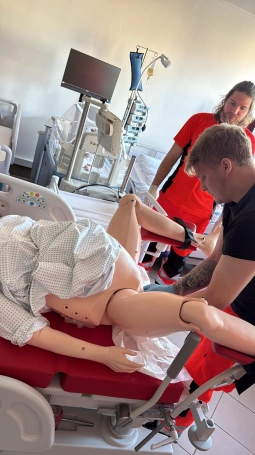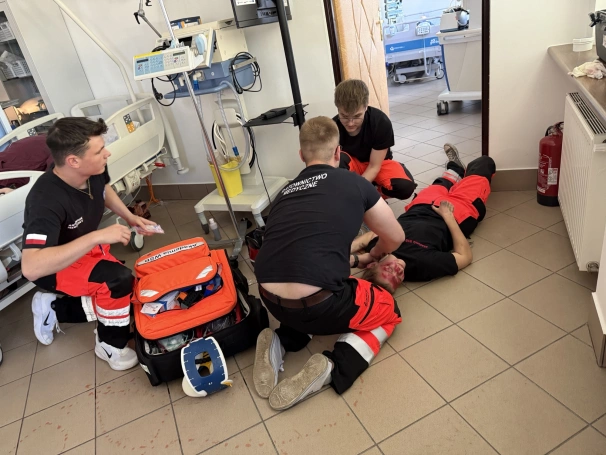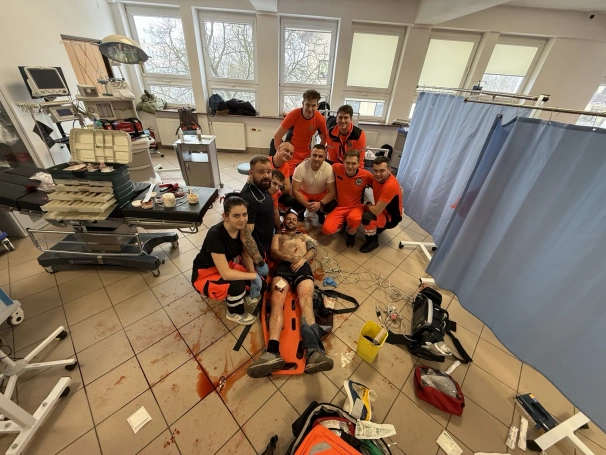- Student
- Student
- News
- Business School
- Doctoral School
- International Dean’s Office
- International Cooperation Office
- Academic Career Office
- Academic Sports Association
- Library
- Student Groups
- Internships
- Electronic Examination Center
- Scholarship office
- Finance Department
- Your Stay in Poland
- Academic Schedule
- The Centre for People with Special Needs
- Alumni and Students Association
- Personal Student Profile
- Support Zone
- Virtual University
- Contact
- Individual Study Plan
- Admissions
- Admissions
- Research
- University
- Erasmus+
Data
24.07.2025
A New Dimension of Education at Collegium Medicum
Master’s Degree Programme in Emergency Medical Services at WSB University
WSB University in Dąbrowa Górnicza is launching a second-cycle (Master’s) degree programme in Emergency Medical Services. This new educational offer responds to the growing demand for highly qualified healthcare professionals and opens new career and academic opportunities for paramedics.
“We want our graduates not only to be effective practitioners but also to be capable of conducting research, implementing innovations, and actively contributing to the development of the emergency medical system,” emphasises Prof. Zdzisława Dacko-Pikiewicz, PhD, Rector of WSB University. “We have modern infrastructure, a highly qualified faculty, and extensive experience in educating medical staff – a solid foundation for this new programme.”
Dr Adam Kabiesz, MD, Dean of Collegium Medicum at WSB University, adds:
“We address this programme to graduates of first-cycle studies and experienced paramedics who wish to deepen their professional competencies and develop in this crucial and forward-looking field. Our curriculum combines the latest scientific achievements with intensive practical training.”
Practice-Oriented and Internationally Relevant Curriculum
The programme has been designed to address the real challenges faced by paramedics both in Poland and internationally. Particular emphasis is placed on developing clinical, interpersonal, and organisational skills, as well as preparing graduates for work in multicultural environments and crisis situations.
The curriculum includes:
- Practical training in high-fidelity simulation environments (Emergency Department, Intensive Care Unit, Operating Theatre)
- Training in the use of modern ultrasound protocols (FAST, eFAST, RUSH, BLUE)
- Courses in tactical and disaster medicine
- Modules developing research and teaching competencies
The programme prepares students not only for operational roles in rescue teams but also for leadership, academic, and research positions. The modern paramedic is expected to be not only an effective field operator but also a team leader, change initiator, and active participant in interdisciplinary healthcare structures.
Sample Courses
- Crisis Intervention and Social Pathologies / Team Communication and Stress Reduction – preparing for action in extreme situations and effective teamwork
- Wound Management, Chest and Abdominal Drainage / Emergency Conditions in Vascular Surgery – developing essential clinical skills
- Patient Rights and Responsibilities / Addictions and Managing Patients Under the Influence of Alcohol or Psychoactive Substances – fostering responsible and ethical patient care
- Interpersonal Skills Development and Cross-Cultural Communication – strengthening soft skills and the ability to work with culturally diverse patients
- Artificial Intelligence in Healthcare / Medicine in the Digital Era – exploring the development of modern, data-driven healthcare
- Team Communication and Emergency Medical Services in an International Context – preparing for work in international rescue teams and global healthcare systems
- “Each of these courses has been carefully designed as a response to the real needs of professional practice and a rapidly changing world. We aim to educate specialists who are not only competent paramedics but also leaders ready to operate in diverse, including international, contexts,” highlights Dr Adam Kabiesz, MD.
A Unique Offer in the Polish Academic Landscape
At present, only two universities in Poland offer second-cycle studies in Emergency Medical Services. From October, WSB University will join this group, expanding the portfolio of its Collegium Medicum. Our programme stands out with its strong emphasis on clinical practice, innovative educational technologies, and preparation for work in an international environment.
![]()
![]()
![]()
![]()



